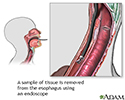Esophageal culture
Culture - esophageal
Esophageal culture is a laboratory test that checks for infection-causing germs (bacteria, viruses, or fungi) in a sample of tissue from the esophagus.
How the Test is Performed
A sample of tissue from your esophagus is needed. The sample is taken during a procedure called esophagogastroduodenoscopy (EGD). The tissue is removed by using a tiny tool or a brush at the end of the scope.
The sample is sent to a lab. There, it is placed in a special dish (culture) and watched for the growth of bacteria, fungi, or viruses.
Other tests may be done to determine what medicine can best treat the organism.
How to Prepare for the Test
Follow your health care provider's instructions on how to prepare for EGD.
How the Test will Feel
During EGD, you will receive medicine to relax you. You may have some discomfort or feel like gagging as the endoscope is passed through your mouth and throat into the esophagus. This feeling will go away shortly.
Why the Test is Performed
Your provider may order this test if you have signs or symptoms of an esophageal infection or disease. You may also have the test if an ongoing infection does not get better with treatment.
Normal Results
A normal result means that no germs grew in the laboratory dish.
Normal value ranges may vary slightly among different laboratories. Talk to your provider about the meaning of your specific test results.
What Abnormal Results Mean
An abnormal result means germs grew in the laboratory dish. This is a sign of an infection of the esophagus, which may be due to bacteria, a virus, or a fungus.
Risks
Risks are related to the EGD procedure. Your provider can explain these risks.
References
Koch MA, Zurad EG. Esophagogastroduodenoscopy. In: Fowler GC, ed. Pfenninger and Fowler's Procedures for Primary Care. 4th ed. Philadelphia, PA: Elsevier; 2020:chap 91.
Sugumar A, Vargo JJ. Preparation for and complications of gastrointestinal endoscopy. In: Feldman M, Friedman LS, Brandt LJ, eds. Sleisenger and Fordtran's Gastrointestinal and Liver Disease. 11th ed. Philadelphia, PA: Elsevier; 2021:chap 42.
Review Date: 8/7/2023




